Rhodes Scholars with Enormous Influence
Named after a British Businessman, mining magnate, and South African politician, Cecil John Rhodes, the scholarship aims to bring outstanding students from all over the world to study at the University of Oxford in England. Making his fortune in diamond mining operations with the help of financial support from NM Rothschild & Sons, Rhodes would eventually hold the monopoly on the world’s diamond supply. An ardent believer of British Colonialism (Rhodesia was named after him), he set up provisions for the scholarship through his estate that would be awarded annually to individuals whom are committed to others and the “common good, and for their potential for leadership,” according to their website. Since his death in 1902, those who have received the scholarship have gone on to leadership roles in the military, politics, and journalism.
These 10 individuals who received a Rhodes Scholarship, demonstrate its powerful influence and how its philosophy continues to matriculate into the minds of future policymakers; swaying public opinion for the “common good.”
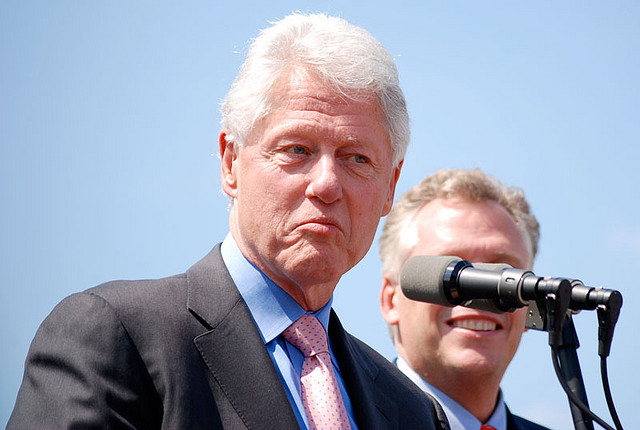 Photo by sharedferret
Photo by sharedferret
Former President of the United States, Clinton has been one of the most influential people in politics the past three decades. In his first term he enacted the Family And Medical Leave Act and Violence Against Women Act as well as key bills relating to crime and gun violence, education, environment, and welfare reform. He also signed the North American Free Trade Act, and was the first to attempt a universal health insurance plan. However, his influence is more often eclipsed by his tumultuous affair with one of his interns, Monica Lewinski.
Clinton was awarded the Rhodes Scholarship to University College, Oxford where he studied philosophy, politics, and economics, though he did not receive his degree there. He had transferred to Yale Law for his senior year.
While attending Oxford, he participated in Vietnam War Protests and organized an October 1969 Moratorium to End the War in Vietnam event. He also received draft deferments while a student, but was concerned about losing them when attending law school at Yale.
He would apply and withdraw his application to join the ROTC, saying in a letter to the officer in charge of the program that he opposed the war, would not volunteer to serve in uniform, but would subject himself to the draft, and would serve if selected only as a way “to maintain my political viability within the system.”
Clinton’s political opponents charge that he dodged military service.
Ideologically Clinton was a New Democrat, which was reflected through policies as a centrist Third Way philosophy of governance. He would serve as Governor of Arkansas from 1979-1981, the State’s Attorney General from 1977-1979, and the 42nd President of the United States from 1993-2001.
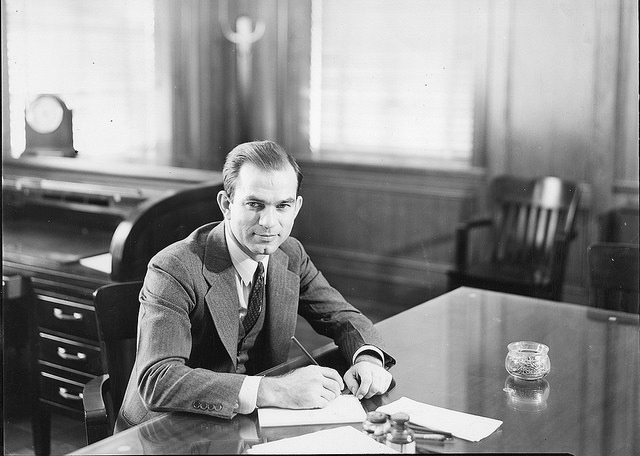 Photo by Arkansas Special Collections
Photo by Arkansas Special Collections
2. James William Fulbright
Fulbright used his 1926 Rhodes Scholarship to study law, was elected to the House of Representatives in 1943, and then served in the Senate from 1945 to 1974. He later established the Fulbright Program to provide grants for students and professionals to study, teach, and conduct research abroad. More than 250,000 individuals have received Fulbright grants.
He was a Southern Democrat and a staunch multilateralist, who supported the creation of the United Nations. He was also known to be segregationist who signed the Southern Manifesto.
Fulbright died of a stroke in 1995 at the age of 89. A year later, at a 50th anniversary dinner of the Fulbright Program held June 5, 1996 at the White House, President Bill Clinton said, “Hillary and I have looked forward for sometime to celebrating this 50th anniversary of the Fulbright Program, to honor the dream and legacy of a great American, a citizen of the world, a native of my home state and my mentor and friend, Senator Fulbright.”
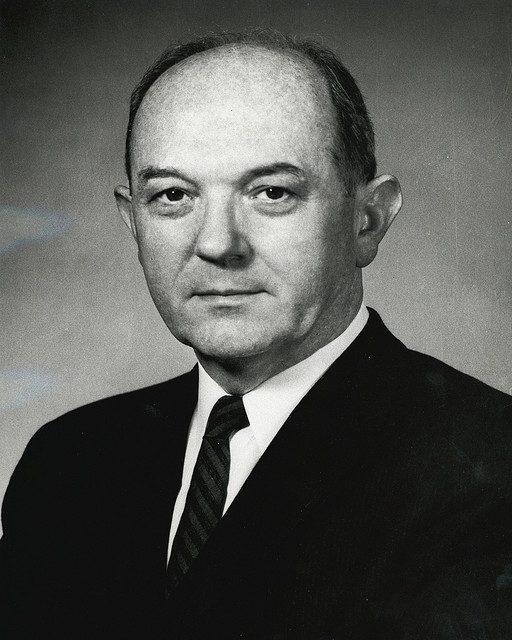 Photo by U.S. Department of State
Photo by U.S. Department of State
3. Dean Rusk
Rusk used his 1931 Rhodes Scholarship to study history and political science. A Reserve Captain and staff officer during WWII, Rusk was a Colonel by the time the war ended, decorated with the Legion of Merit with Oak Leaf Cluster.
“He returned to America to work briefly for the War Department in Washington. He joined the Department of State in February 1945, and worked for the office of United Nations Affairs. In the same year, he suggested splitting Korea into spheres of U.S. and of Soviet influence at the 38th parallel north. He was made Deputy Under Secretary of State in 1949. He was made Assistant Secretary of State for Far Eastern Affairs in 1950 and played an influential part in the US decision to become involved in the Korean War, and also in Japan’s postwar compensation for victorious countries, such as the Rusk documents. However he was a cautious diplomat and always sought international support.”
Rusk was a Rockefeller Foundation trustee from 1950 to 1961. In 1952 he succeeded Chester L. Barnard as president of the Foundation.
He served as U.S. Secretary of State from 1961 to 1969 under presidents John F. Kennedy and Lyndon B. Johnson. In Rusk’s autobiography, As I Saw It, he claimed to not have had a good relationship with President Kennedy. He said that the president was often irritated by Rusk’s reticence in advisory sessions and felt that the State Department was “like a bowl of jelly” and that it “never comes up with any new ideas.”
Following his retirement, he taught international law at the University of Georgia School of Law in Athens, GA. Rusk died of heart failure at the age of 85 in 1994.
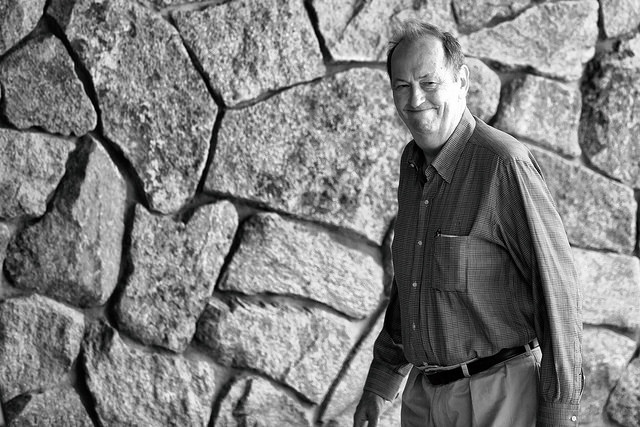 Photo by Thomas Hawk
Photo by Thomas Hawk
4. William Warren Bradley
Bradley was already an Olympic gold medal recipient for basketball when he began his study of politics, philosophy, and economics at Oxford in 1965. He would have a Hall of Fame career in basketball before entering the Senate in 1978 and running as a presidential candidate in the 2000 primary.
As a Senator, Bradley acquired a reputation for being somewhat aloof and was thought of as a “policy wonk,” specializing in complex reform initiatives. Among them was the 1986 federal tax code overhaul, co-sponsored with Dick Gephardt, which reduced the tax rate schedule to just two brackets, 15 percent and 28 percent, and eliminated many types of deductions. Domestic policy initiatives that Bradley led or was associated with included reform of child support enforcement, legislation concerning lead-related children’s health problems, the Earned Income Tax Credit, campaign finance reform, a re-apportioning of California water rights, and federal budget reform to reduce the deficit; which in 1981 included supporting Reagan’s spending cuts but opposing his parallel tax cut package.Bradley was one of only three senators to take this position. He also sponsored the Freedom Support Act, an exchange program between the republics of the former Soviet Union and the United States.
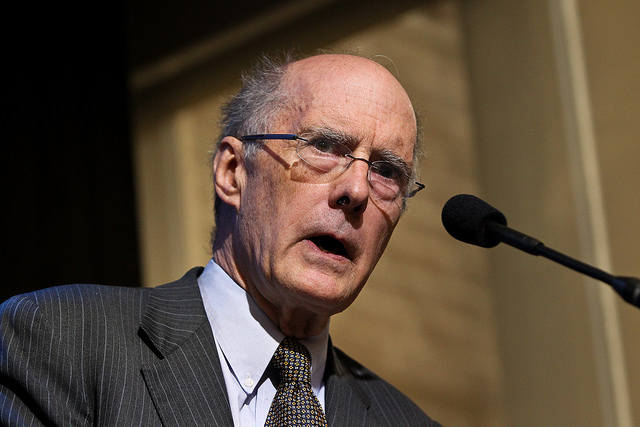 Photo by BrookingsInst
Photo by BrookingsInst
5. Strobe Talbott
Talbott was awarded the scholarship in 1968 and spent his time at Oxford translating Nikita Khrushchev’s memoirs into English. Another one of Bill Clinton’s Oxford friends, he went on to be Deputy Secretary of State from 1994 to 2001. Talbott was also president of the Brookings Institution— a Washington, D.C.-based political research facility that helped negotiate an end to the war in Yugoslavia in 1999.
The former Russian Foreign Intelligence Service (SVR) operative Sergei Tretyakov claimed that the SVR considered Talbott a source of intelligence information and classified him as “a special unofficial contact,” although “he was not a Russian spy.” These allegations have been unproven but focus on Talbott’s relationship with Russian ambassador Georgiy Mamedov, who called the allegations “blatant lies”.
Talbot was quoted in Time Magazine saying, “In the next century, nations as we know it will be obsolete; all states will recognize a single, global authority. National sovereignty wasn’t such a great idea after all.”
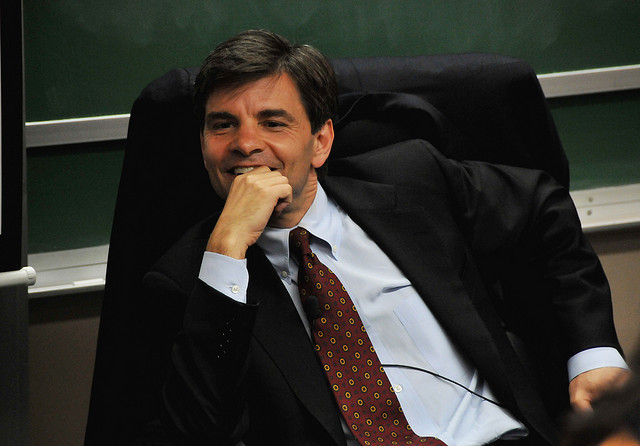 Photo by Tulane Public Relations
Photo by Tulane Public Relations
6. George Stephanopoulos
Rejected the first time during his senior year at Columbia for the scholarship, but Stephanopoulos succeeded the second time, using his 1984 Rhodes Scholarship to earn a master’s degree in theology at Balliol College. He maintains that he spent much of that time trying to root his political leanings in the deeper philosophies that he studied there.
Later, during the 1992 presidential campaign, he would serve as Bill Clinton’s senior political adviser, then as communications director during Clinton’s presidency. He currently hosts the Sunday morning news show This Week and is the chief Washington correspondent for ABC News.
The journalist’s close ties to the Clinton’s have recently stirred up controversy because of his recent donation of $75,000 to the Clinton Global Foundation. Information he did not disclose during news reports about the foundation. He had made an on-air apology, but that hasn’t stopped many from considering his recusal from moderating any political debates.
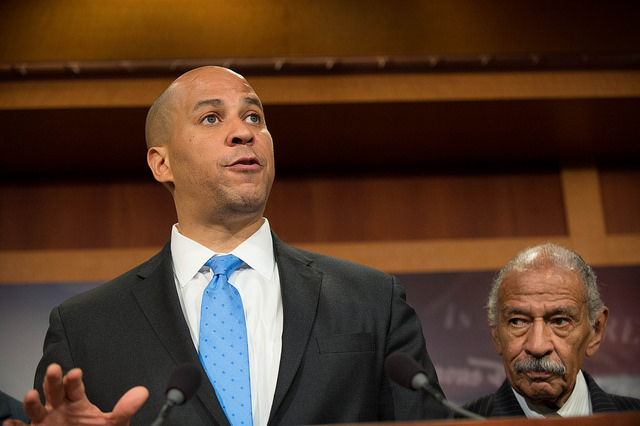 Photo by Senate Democrats
Photo by Senate Democrats
7. Cory A. Booker
Booker began his studies at Oxford in 1992, gaining an honors degree in modern history. He is now a Democratic senator from New Jersey and served as mayor of racially diverse Newark, New Jersey, the largest city in the state.
Before Booker took office as mayor of Newark, New Jersey investigators foiled a plot to assassinate him led by Bloods gang leaders inside four New Jersey state prisons. The motive for the plot was unclear, but was described variously as a response to the acrimonious campaign and to Booker’s campaign promises to take a harder line on crime.
A member of the Mayors Against Illegal Guns Coalition, which aims to “making the public safer by getting illegal guns off the streets”. In addition to his crime-lowering initiatives, Booker doubled the amount of affordable housing under development and quadrupled the amount under pre-development.